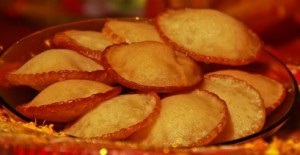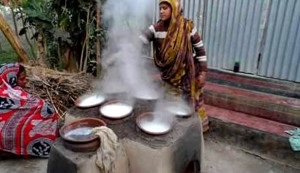Bahauddin Bahar from Dhaka
Mother made the oil pitha (Cake). Many people have known the oil pitha as Pakan or Pakoyan pitha. Don’t know whether it has any special name? I used to be with my mother at the first stage of making this oil pitha, as I like this pitha very much. I like to eat the hot pitha that leads me to stay beside my mom during her making of Pitha. But, my mom never gives me the first piece of her making. and not even 2nd and 3rd. Lastly she gave me to eat the 4th one. I was quite surprised!

In the university I came to know with a new knowledge. Its name Indigenous Knowledge. Traditional knowledge or local knowledge of Bengali. But this knowledge is much more complex in terms of both defining and recognizing. Anyway, we learned that most of our lives are involved with some works and some sorts of knowledge. It can be any strategy, information or experience. And, it is revealed with the belief and some rituals. But apparently, it may be difficult to understand this knowledge and explain it in today’s modern or western education. Yet this knowledge has territorial recognition and acceptance. This knowledge is usually acquired by people through long-lasting real experiences or generations.
For many days, the oil pitha piece of mother’s hand is not eaten not being possible. And because of my favorite, I eat myself. But it is never like a mother made pitha. Each time I observe that the first few pieces are not nice. It does not get flowered. It looks like cling. After 3-5 pieces of making the shape of the pitha gets better. This experience reminds me why my mom did not want to give me the first three pieces of Pitha she made.
The mixture of pitha may take time and after making 3 pitha consecutively the mixer gets mixed better that resulted in the better shape of the pitha. Or it may take time to co-existence between hot oil and cakes made of cakes. Or she examines it that the pitha is beautiful. An element may have become more or less likely. By making 3 pieces of pitha, she concluded that the mixture of pitha should be appropriate.
Is that the reason for not giving his beloved child the first 3 pieces of pitha? Asking my mother to this perception today might have answered the answer – but that is not possible. I am convinced that this is not about my mother only; this happens to many mothers. Mothers may have learned from this story behind the preparation of pitha from their mother, mother-in-law, grandmother or great grandmother. Or she has discovered these three cakes made by making cakes for a long time. But how would this complex equation explain her child? So maybe this metaphor has taken. Or maybe my mother not even have this explanation. He might have heard this metaphor from her mother and other predecessors. And this is how she gives this metaphorical explanation from a generation like ‘Relay Race’ to another generation. Metaphor, anyway, if its explanation is logical in modern knowledge, then it is really an art of rich knowledge. In particular, this complex equation is so simple and easy to interpret with a metaphor. And making of pita is a knowledge and skill that is unquestionable.
 One of the main preparations time for this oil pitha is Late Autumn. Harvest festival’s time. Molasses made from date juice and flour from new rice are mandatory elements. Mothers believed, it was not possible to make this oil pitha without these elements. Sugar instead of molasses, the color, taste, and texture of the pitha are not like the original pitha. The same applies to date juice molasses or other types of molasses. Again, any rice flour is not applicable. A special type of rice variety is necessary for the preparation of pitha. My father used to plant that rice variety in a small part of the land. I feel ashamed of myself that I can’t remember the name of the specific species of rice. On the other hand, the traditional rice crusher (dheki) is needed for rice crushing. The rice flour made from the machine is never acceptable.
One of the main preparations time for this oil pitha is Late Autumn. Harvest festival’s time. Molasses made from date juice and flour from new rice are mandatory elements. Mothers believed, it was not possible to make this oil pitha without these elements. Sugar instead of molasses, the color, taste, and texture of the pitha are not like the original pitha. The same applies to date juice molasses or other types of molasses. Again, any rice flour is not applicable. A special type of rice variety is necessary for the preparation of pitha. My father used to plant that rice variety in a small part of the land. I feel ashamed of myself that I can’t remember the name of the specific species of rice. On the other hand, the traditional rice crusher (dheki) is needed for rice crushing. The rice flour made from the machine is never acceptable.
Now there are no oil cakes at home. Along with mother, this oil pitha is lost from our family. Pitha-Centered Mother’s knowledge is also lost. Now nobody else makes an oil pitha. Suddenly, if anyone makes but there is no traditional element as like my mother used. The flour or rice crumbs, sugar or molasses buy from the market. There is no special variety; if any is acceptable. Do not let the first 3 pieces be eaten.
Our mothers, especially the mother of the villages, have been bringing this kind of knowledge for a long time. Each element of nature is associated with each level of their knowledge. In course of time, though, their knowledge and nature are being made into a kind of emptiness. The relationship between knowledge and nature is complementary to each other. In the case of these oil pitha two elements of nature are needed. Molasses made with date juice and a specific type of rice flour.
 These two components were produced and processed at home. In no way was dependent on the market. From the rice plantation to the rice flour, till each step, the mothers had a direct role. And there was an unwritten, non-informative knowledge on every level, it was not enough to say. On the other hand, molasses also were made at home. The molasses was produced in the home juice collected from the date palms. Made of molasses from that juice and preserve through a year, in every step of these process, mother’s knowledge was in-built naturally.
These two components were produced and processed at home. In no way was dependent on the market. From the rice plantation to the rice flour, till each step, the mothers had a direct role. And there was an unwritten, non-informative knowledge on every level, it was not enough to say. On the other hand, molasses also were made at home. The molasses was produced in the home juice collected from the date palms. Made of molasses from that juice and preserve through a year, in every step of these process, mother’s knowledge was in-built naturally.
But her absence made such a vacuum about pitha-centered knowledge in a family. Likewise, these two elements of nature have also been lost from a family. In many cases, it is reversed. It can be seen that this knowledge can be gradually lost due to the extinction of one of these two components of nature. The relationship between life and nature with local knowledge of a specific subject is irrelevant. One cannot survive without another. So if the knowledge is to be preferred, then the elements of nature should be preferred. To preserve nature, the knowledge associated with it must also be exercised, emphasized and acknowledged. In all these cases our collective behavior seems to be somewhat old-fashioned, but it does not have an option for the sustainability of this world. To give a living world to a new generation, it is very important to tie up the mail of local culture and its public knowledge and nature’s components.
translated by Jannatul Ferdous
